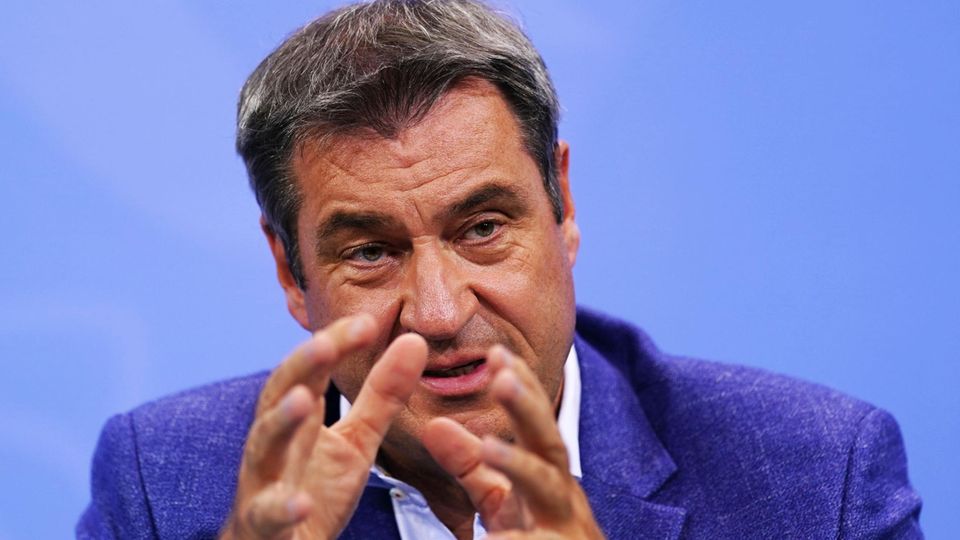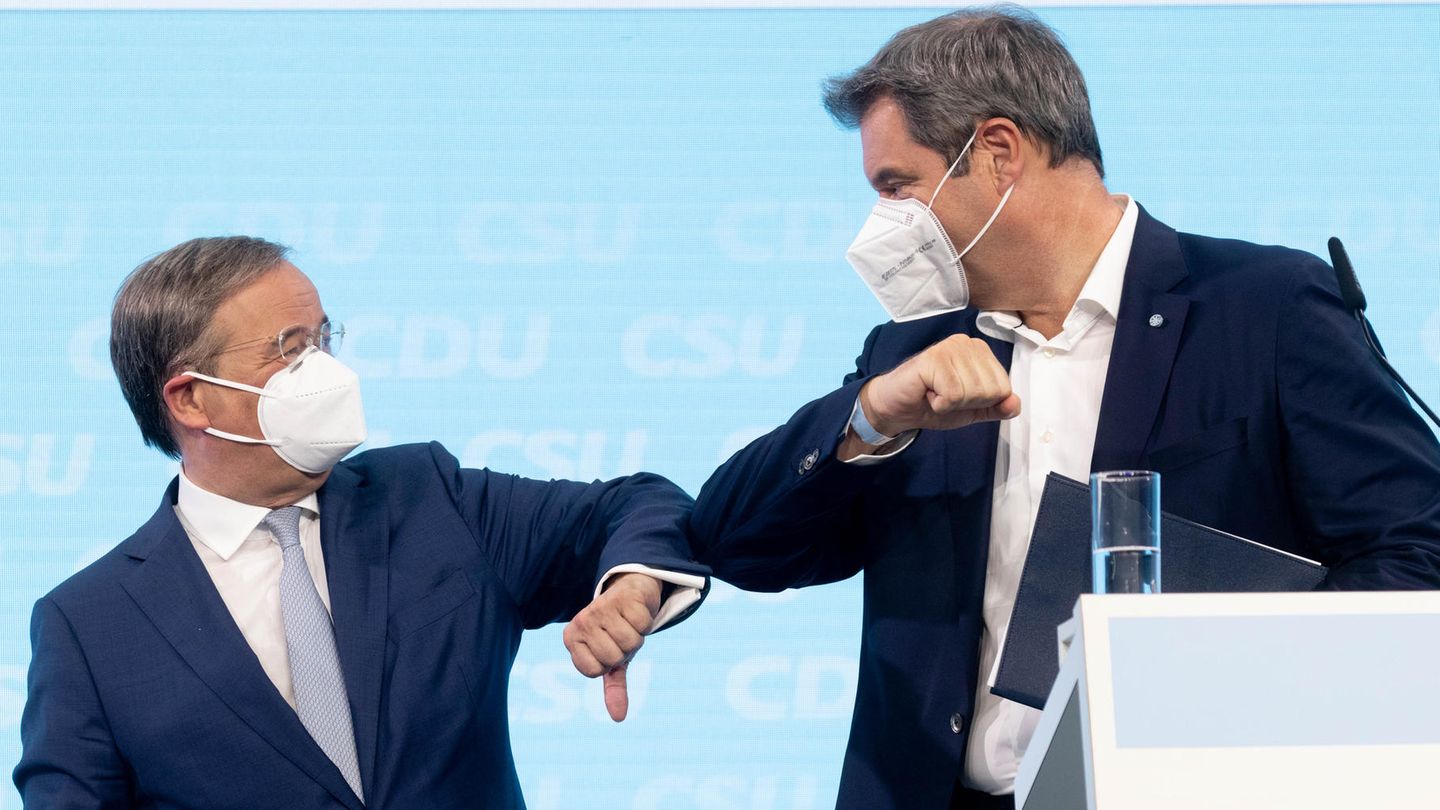The tough fight for the candidacy for chancellor between Armin Laschet and Markus Söder continues to have an effect. Söder’s persistent taunts reveal the conflicts in the Union parties. The CDU and CSU need one thing above all else in the election campaign: solidarity.
Those who are looking for explanations for the disastrous situation of the CDU and CSU in the current surveys in the CSU these days usually hear a name: Armin Laschet. As much as the party leaders in Munich tried to achieve conciliatory and loyal tones after the fierce power struggle for the candidacy for chancellor, the defeat of party leader Markus Söder in the candidate poker against the CDU leader still reverberates. “With Söder at the top we wouldn’t have the problems now,” say many Christian Socialists.
In fact, about four weeks before the election day, the Union has to be told that the starting position for the upcoming hot phase of the election campaign is extremely bad. The CDU and CSU still come to a mere 23 percent in surveys, just as much as the SPD. On September 26, the black sister parties are threatened with a debacle. And what’s more – if the Germans were allowed to vote directly for the next chancellor, SPD candidate Olaf Scholz could be pretty sure of his cause.
CDU pissed off because of Söder’s constant teasing
But if you take a closer look at the situation in the Union, you will quickly notice that the current dilemma cannot be blamed on Laschet’s sole responsibility. Although he undoubtedly bears a very special responsibility as a candidate for chancellor, Söder also has to put up with legitimate questions about his role, both now and especially in the event that the Union really does that after the 16-year era of Angela Merkel (CDU) Would lose the Chancellery.
The situation in the CDU is also complicated: Many are pissed off here because Laschet messed up with his uncontrolled laugh during the flood disaster, for example, to present himself as a crisis manager. At the same time, however, there is also increasing irritation about Söder – recently, for example, because he did not want to do without numerous spikes against Laschet at the official election campaign kick-off in Berlin last Saturday.
Friedrich Merz: “Expect Markus Söder to stop now”
Söder’s demands or warnings that the Union must now “finally do a sensible election campaign” or that you cannot get to the Chancellery by sleeping car always fall back on Laschet. He expects Söder to stop his taunts “and that he also wants to win the election together with us and that he is fighting,” said ex-Union faction leader Friedrich Merz (CDU) at an event on Tuesday, according to a report by the Tagesspiegel Sauerland, where the 65-year-old is running.
Merz, who is said to have ambitions for a ministerial office, accused Söder of deliberately damaging the Union with his taunts against Laschet. “I told him that too,” said Merz. Merz was only “partially satisfied” with Söder’s speech at the Union’s election campaign last Saturday in Berlin. The CSU boss “could have done without some remarks”.

Söder must be careful not to harm himself
The elephant has long been in the room, say other CDU strategists, who are also not happy with Söder’s approach. The Bavarian diverts the focus every time on Laschet and so from the competitor, it is argued. If you ask around among leading CDU politicians in the countries, there is also much clearer criticism of Söder. Its appearance is incredibly annoying, it is said behind closed doors. The CSU boss is destructive on the way, which is not well received in the CDU. Söder must be careful not to harm himself.
But in high CDU circles there is also understanding for Söder. It is clear that he cannot be satisfied with the situation around Laschet. And after the tough ten-day power struggle for the candidacy for chancellor in the spring, in which Söder Laschet was ultimately defeated, one could hardly expect the CSU boss to be happy.
CSU is currently not doing well in Bavaria
But it is not only these taunts that are causing unrest in the Union and among the conservative regular voters who are concerned about harmony. The fact that Söder also speaks in favor of Laschet in the same speeches does not seem very credible. The situation for Söder becomes all the more difficult if you take into account how each word is interpreted: If he criticizes Laschet too much, he is considered an irreconcilable troublemaker because he wanted to become chancellor himself. If he refrains from criticism for reasons of loyalty, this will be interpreted in his own ranks as a weakness in leadership.
What is easily forgotten in view of the undoubtedly many faux pas that Laschet has stepped into with verve in recent weeks: The CSU is by no means dazzling in Bavaria – recently the Christian Socials came in a survey to just 34.5 percent and ended up well below the historically poor result of the 2017 Bundestag election (38.8 percent). Even if the reasons for this are readily located in the federal trend in Munich, this certainly does not go far enough as the sole explanation.
Söder and Laschet avoid appearing together
Because like Laschet and the CDU, Söder and the CSU have not yet managed to successfully set topics in the election campaign. Corona here, tax cut demands (also on Laschet) there and now and then a little climate protection – for a party like the CSU, which sees itself as a pacemaker, there is a big gap between claim and reality. And there is something else that Söder has to be chalked up to as well as Laschet: The prediction that it is not the SPD but the Greens who are the main opponents in the election campaign has proven to be a fallacy.
Within the CSU there is therefore also growing dissatisfaction with Söder’s role in the election campaign so far. While some accuse him of a lack of loyalty and support towards the elected top candidate Laschet, other critics want the exact opposite through a clearer edge against Laschet.
However you turn it around – the overall picture of the Union in the election campaign seems more forced than coherent. It also fits that Söder and Laschet are not exactly keen on appearing together. In Bavarian areas affected by the flood, SPD chancellor candidate Olaf Scholz even appeared on Söder’s side. In the pandemic in particular, it would have been easy to let each other at least have a word of greeting at the events – Söder at the CDU, Laschet at the CSU. But as is so often the case, the CSU prefers to keep to itself at the start of its election campaign on Tuesday in Unterschleißheim. Also a statement.
David William is a talented author who has made a name for himself in the world of writing. He is a professional author who writes on a wide range of topics, from general interest to opinion news. David is currently working as a writer at 24 hours worlds where he brings his unique perspective and in-depth research to his articles, making them both informative and engaging.




